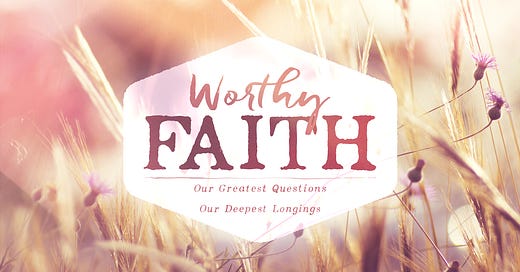In This Edition:
A Faith Worthy Of Our Longings
“Jesus said to him, “I am the way, and the truth, and the life. No one comes to the Father except through me.” (John 14:6 ESV)
IS THIS ALL THERE IS?
In 1969, Peggy Lee walked into a studio and described a series of events in her life such as experiencing a house fire, or going to the circus, or falling in love. They all seemed so grand at first, but then each event left something missing, something elusive that didn’t fulfill the promise of anything meaningful and enduring. So each verse leads to the same chorus:
Is that all there is?
Is that all there is?
If that’s all there is my friends,
Then let’s keep dancing.
Let’s break out the booze and have a ball,
If that’s all—
There is.
Look around. What once seemed like our “summer of discontent” seems to have turned into decades. 1969 was a half century ago. The dawn of a new one made us all think the potential for hope was just around the corner, but instead, the average suicide rate rose 24%. And the stated reason for this rapid rise? “Hopelessness.”
We are the most advanced civilization in the history of the world. Did you know the chief mode of transportation 200 years ago was the chief mode of transportation 2000 years ago? And we went from the horse to the rocket ship in just two centuries. The average person understands the basics of chemistry and genetics better than experts who lived not that long ago. We have more information at our disposal and greater technology at our fingertips than ever before. And what is the result? We are sick, scared, emotionally drained, in broken after broken after broken relationships, in a society that appears to be coming apart at the seams. We still stand in need of hope, purpose, moral guidance, the fulfillment of justice or even agreement on what in the world that is.
So what should we do about it? Peggy Lee says “dance it up and have a ball, since that’s all there is.” It was the Greek philosopher Epicurus—the father of the pleasure-seeking philosophy that goes by his name—who coined the phrase “eat, drink, and be merry! For tomorrow we die.” And the writer of Ecclesiastes sees the world through the same lens:
“Enjoy life with your wife, whom you love, all the days of this meaningless life that God has given you under the sun—all your meaningless days…[because] everything to come is meaningless.” (Ecc 9:9 & 11:8 NIV).
But this is where the story takes a profound turn. Deep down, we want something more…and our soul cries out for it. Hopelessness seems to be the theme of Green Day’s song Boulevard of Broken Dreams (2004) where Billy Joe sings “I walk alone. My shadow’s the only one that walks beside me.” But keep listening and you’ll see this line in every chorus: “sometimes, I wish someone out there will find me. Til then, I walk alone.” Hopelessness seems to be the theme of Harry Styles’ Sign of the Times (2017), where life is nothing more than feeling stuck and dodging bullets. “Just stop your crying,” says Harry, “it’s a sign of the times.” But keep listening, and you’ll hear the longing: “We gotta get away from here...We can meet again somewhere; somewhere far away from here.” And, of course, we see the conflicted message most clearly in a song by U2 from the Joshua Tree album, released in 1987. I’ve done everything, says Bono—climbed the highest mountain, run through the fields…crawled and scaled city walls. I even believe in the kingdom come, he says; when all the colors will bleed into one. He goes even further. To the one who broke the bonds and loosed the chains, the Christ who carried the cross of my shame, he cries out “you know I believe it…but I still haven’t found what I’m looking for.”
Incredible. We all have a hole in our soul. And we look around at the universe for something to fill it. Youthfulness doesn’t last, money doesn’t heal all wounds, and every technological advancement only makes the problem worse. For some, even religion hasn’t given them the satisfaction they seek. As every day goes by, and we march closer and closer to death, our soul cries out, “is that all there is?”
What if I told you that the God I serve—the God I found in Jesus Christ—provides the answer to the deepest longings of your heart. He can fill that hole in your soul that money, relationships, and even religion can’t fill. And what he offers is no pie in the sky; it will resonate with you.
I’d like us to start with one sentence recorded in the ancient Gospel of John, and placed on the lips of Jesus of Nazareth:
“I am the way, and the truth, and the life.” (John 14:6).
Packed into these ten words are five remarkable claims, which lie at the heart of our deepest longings.
In a world of fading dreams, and plastic people, we long for something real—and Jesus says, “I am.”
In a world full of atrocities and unfairness, we long for proper rules of fairness and procedure—a standard of right by which to judge all things. In short, we long for Justice—and Jesus says, “I am the way.”
In a world full of lies and make-believe fairy tales, we long for truth. And Jesus says, “I am the truth.”
In a shallow culture that takes pride in glamorizing senseless activities, we long for meaning—and Jesus says, “I am…life.”
CONSIDER THE CLAIM
Maybe that’s why the book of Ecclesiastes—recognizing no meaning under the sun and no real justice under the sun—still longs for what is real and what is true. So, he ends his book by giving this sage piece of advice: “Remember your Creator in the days of your youth.” And here is the conclusion of the whole matter (my final piece of advice): Fear God and do what he tells you. In other words, to borrow a line from Father Cavanaugh in the movie Rudy: “Son, in 35 years of religious study, I have only come up with two hard incontrovertible facts: there is a God, and I’m not him.”
Perhaps you have been told that Christianity is a non-thinking leap-in-the-dark means of escaping reality–inventing your own meaning and believing fairy tale lies about a God disconnected from any serious concerns of life. Nothing could be further from the truth. The claim being made is that the God we see in Jesus is the antidote to such things.
I start with the claim of Jesus for a very good reason. I can point out vagaries and longings of the heart; I can identify puzzle pieces and suggest that they fit together. But the whole project remains a guessing game until someone reveals the image on which the puzzle pieces are meant to be superimposed.
That cover, says Christianity, is the ONE thing—one uniting story, one fundamental principle which is itself true, transcendent, and the quintessential definition of beauty, freedom, and love.
Consider the God I see in Christ as the foundation of all reality, the source of all meaning, the root of justice, the ground of objectivity, and the definition of truth. Science will continue to probe and question, and people will continue to construct our own realities. But Christianity gives language to the realities we create. What we call “problems”, God calls “sin.” What we call “self-help,” God calls “seeking salvation.” What Alcoholics Anonymous has found rewarding in seeking a “higher power,” Christianity calls “finding the Living God.”
Christianity suggests that the very source of reality, meaning, justice, objectivity, and truth is not some cold impersonal abstraction in the sky. He is a living, loving God who meets us in the person of Jesus Christ. A God who became one of us, lived among us, died for us, and rose to provide a way toward ultimate happiness grounded in real, genuine, meaningful truth.
A sermon preached at the West Side Church of Christ titled “A Faith Worthy of our Longings.” It is the second lesson in the series “A Worthy Faith.” This lesson appears on the Life on the West Side podcast (Season 2, Episode 31). Available on all podcast platforms.
Coming Soon To The West Side
We are maxed-out on credit cards, increasing our anxiety meds, and headed to marriage counseling because of money stress. All while making more money than most people in the world. And we don’t think we have a problem.
Money blindness leads to money sickness.
And then we have these stories. A widow who gives her last two pennies away. A Macedonian church that begs for an opportunity to give beyond their ability. A Savior who calls a man whose identity is wrapped up in money and things to sell his things and give away the money.
It challenges us to re-imagine what it means to be “blessed.” And it calls us to ask: after we give our hearts, minds, bodies, and souls to the Lord (in baptism and in service), what can we give next?
“The Greedy & The Giver.” Sunday at 9AM. West Side Church of Christ. This lesson will be livestreamed on Sunday at 9 AM (CST) on facebook or YouTube, or you can visit my website later to watch the sermon, read the transcript, or listen to it as a podcast. If you are in the area, we would love to have you join us.
Matthew declares that Jesus enters the world as “God with us.” But what does that mean? Join us on December 4, 11, and 18 as well consider the power and significance of the birth of Christ according to three Bible writers: Matthew, Luke, and John.
These lessons will be livestreamed on Sundays at 9 AM (CST) on facebook or YouTube, or you can visit my website later to watch the sermons, read the transcripts, or listen to them as a podcast. If you are in the area, we would love to have you join us.
Happy Thanksgiving!
(Photo credit: Pro Church Media)
I am thankful to each of you. May God richly bless you this Thanksgiving season and always.
Subscribe to Life on the West Side
My name is Nathan Guy, and I serve as the preaching minister for the West Side Church of Christ in Searcy, Arkansas. I am happily married to Katie and am the proud father of little Grace. You can find more resources on my website over at nathanguy.com. Follow me: Facebook, Instagram, Twitter, and YouTube.









